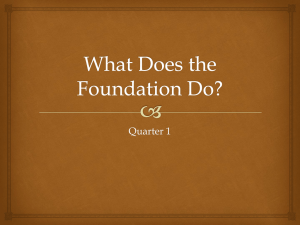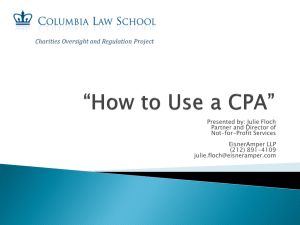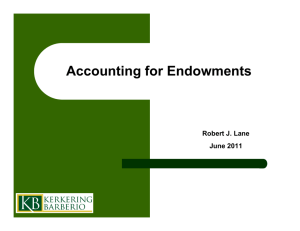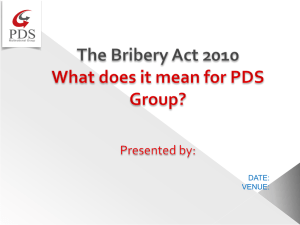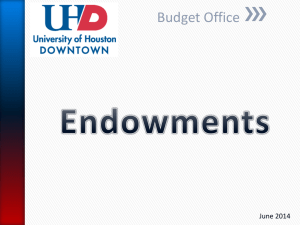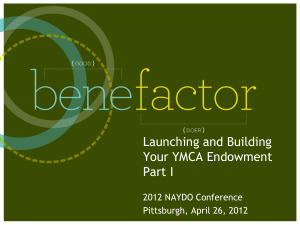Legal Aspects of Fund Management-Section 1
advertisement
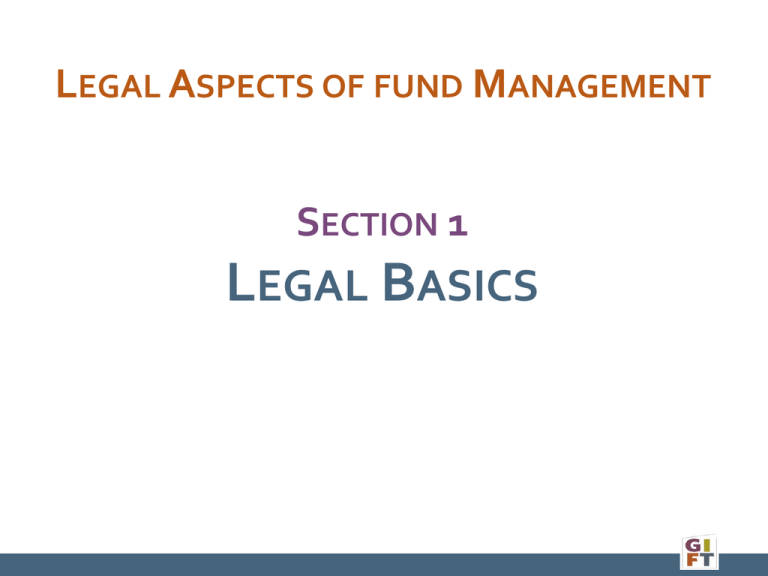
LEGAL ASPECTS OF FUND MANAGEMENT SECTION 1 LEGAL BASICS Indiana State Law INDIANA STATE LAW • Indiana Nonprofit Corporation Law • Indiana Trust Law • Uniform (Prudent) Management of Institutional Funds Act (UPMIFA) 3 INDIANA NONPROFIT CORPORATION LAW 4 NONPROFIT CORPORATION DEFINED IC 23-17-2-7: (a) "Corporation" means a public benefit, mutual benefit, or religious corporation incorporated under or subject to this article. (b) The term does not include a foreign corporation. (c) For purposes of IC 23-17-24, the term does not include a homeowners association (as defined in IC 34-6-2-58). 5 Trust Law 6 BRIEF HISTORY • Most charitable organizations were originally established under state trust law prior to the creation of the nonprofit corporation act. • Trust law imposes a higher fiduciary standard of care: (liability for mere negligence) • Most charitable organizations (including community foundations) are now nonprofit corporations with a lower standard of care (liability for gross negligence) plus immunity protections for directors and other volunteers 7 TRUST AND CORPORATE LAW • Gift to charitable trust is gift “in trust” - implies duty of obedience of trustee to comply. • Gift to nonprofit corporation: some state courts have implied a gift “in trust” and other states the charity is bound pursuant to contract law or other legal concepts. • Most community foundation fund agreements explicitly state that it is not a gift “in trust” nor creating a trust. • UPMIFA applies to trusts and nonprofit corporations. U(P)MIFA: ENDOWMENT LAW 9 WHAT’S IN A NAME? • Uniform Management of Institutional Funds Act - former and current name of the Indiana law of charitable endowments. • Indiana adopted most of the provisions of the Uniform Prudent Management of Institutional Funds Act (UPMIFA) recommended by the Uniform Law Commission, replacing the former UMIFA statute in 2007-08. 10 ENDOWMENT FUND IC 30-2-12-2: "Endowment fund" means an institutional fund, or any part of the fund, not wholly expendable by the institution on a current basis under the terms of the applicable gift instrument. The term does not include assets that an institution designates as an endowment fund for the institution's use (i.e., quasi-endowment or board designated endowment). 11 INSTITUTION IC 30-2-12-5: "Institution" means any of the following: (1) A person, other than an individual, that is organized and operated exclusively for charitable purposes. (2) The state, including any agency or instrumentality of the state, or a unit of local government to the extent that the state or unit holds funds exclusively for charitable purposes. (3) A trust that has only charitable interests … 12 PERSON IC 30-2-12-6.4: "Person" means an individual, a corporation, a business trust, an estate, a trust, a partnership, a limited liability company, an association, a joint venture, a public corporation, the state of Indiana, a state agency or instrumentality, a unit of local government, or any other legal or commercial entity. 13 INSTITUTIONAL FUND IC 30-2-12-6: "Institutional fund" means a fund held by an institution exclusively for charitable purposes. The term does not include the following: (1) A fund held for an institution by a trustee that is not an institution. (2) A fund in which a beneficiary that is not an institution has an interest, other than possible rights that could arise upon violation or failure of the purposes of the fund. (3) Assets held by an institution primarily for charitable purposes and not primarily for investment purposes. 14 GIFT INSTRUMENT IC 30-2-12-3: "Gift instrument" means a record, including any institutional solicitations, under which property is granted or transferred to or held by an institution as an institutional fund. IC 30-2-12-6.7: "Record“ means information that is: (1) inscribed on a tangible medium; or (2) stored in an electronic or other medium; and is retrievable in a perceivable form. 15 INTERPRETING GIFT INSTRUMENTS IC 30-2-12-9(d) A gift instrument that designates a gift as an endowment or contains a direction or authorization to use only income, interest, dividends, rents, issues, or profits, or to preserve the principal intact, or a similar direction: (1) creates an endowment fund of permanent duration unless the gift instrument states otherwise; and (2) does not otherwise limit the authority to appropriate or accumulate under subsection (a). LIMITATIONS ON AUTHORITY IC 30-2-12-9(c) To be effective, a gift instrument must specifically state a limitation on the authority of an institution to appropriate or accumulate under subsection (a) of IC 30-2-12-9 UPMIFA – A “DEFAULT” STATUTE Current agreements that reference or promise the provisions of the former UMIFA statute – such as observing “historic dollar value” as a “shut off” valve for a fund - remain valid unless expressly revoked 18 UPMIFA – A “DEFAULT” STATUTE If an agreement does not reference any applicable law, UPMIFA will apply 19 SPENDING/INVESTING AUTHORITY IC 30-2-12-9 (a) Subject to the terms of a gift instrument, an institution may appropriate for expenditure or accumulate so much of an endowment fund that the institution determines is prudent for the uses, benefits, purposes, and duration of the endowment fund. Except as provided in a gift instrument, the assets in an endowment fund are donor restricted until appropriated by the institution. 20 PRUDENCE DEFINED (b) In determining to appropriate or accumulate endowment funds, an institution shall: (1) act in good faith and with the care a prudent person acting in a like position would use under similar circumstances; and (2) consider the following factors: (A) The duration and preservation of the endowment fund. (B) The purposes of the institution and the endowment fund. (C) General economic conditions. (D) The possible effects of inflation or deflation. (E) The expected total return from income and the appreciation of investments. (F) Other resources of the institution. (G) The investment policy of the institution. 21 UPMIFA IC 30-2-12-14 Duties of Person or Institution Managing or Investing Institutional Funds MANAGING OR INVESTING DUTIES IC 30-2-12-14 (a) An institution that manages or invests an institutional fund shall consider the following: (1) The intent of a donor expressed in a gift instrument. (2) The charitable purposes of the institution. (3) The purposes of the institutional fund. 23 DUTIES OF LOYALTY AND PRUDENT CARE (b) A person who is responsible for managing or investing an institutional fund shall: (1) comply with the duty of loyalty imposed by any law; and (2) manage or invest the fund in good faith and with the care a prudent person acting in a like position would use under similar circumstances. 24 COSTS/VERIFY FACTS/POOLING (c) An institution that manages or invests an institutional fund: (1) may only incur costs that are appropriate and reasonable in relation to: (A) the assets of; (B) the purposes of; and (C) the skills available to … the institution; and (2) shall make a reasonable effort to verify facts relevant to the management and investment of the fund. (d) An institution may pool two (2) or more institutional funds for purposes of management or investment. 25 FACTORS TO CONSIDER IN INVESTING AND MANAGING (e)(1)… (A) General economic conditions. (B) The possible effects of inflation or deflation. (C) The possible tax consequences of investment decisions or strategies. (D) The role of each investment or course of action in relation to the overall investment portfolio of the institutional fund. (E) The expected total return from income and the appreciation of investments. (F) Other resources of the institution. (G) The needs of the institution and institutional fund to make distributions and to preserve capital. (H) The relationship or value of an asset to the charitable purposes of the institution. 26 INDIVIDUAL ASSETS (e)(2) An institution shall make management and investment decisions about an individual asset: (A) in the context of an institutional fund's portfolio of investments as a whole and not in isolation; and (B) as part of an overall investment strategy that has risk and return objectives reasonably suited to the institutional fund and to the institution. 27 DIVERSIFICATION (e)(3) Except as otherwise provided in law, an institution may invest in any kind of property or type of investment. (4) An institution shall diversify the investments of an institutional fund unless the institution reasonably determines that, due to special circumstances, the purposes of the institutional fund are better served without diversification. 28 DISPOSITION OF GIFTS (e)(5) Within a reasonable time after receiving property, an institution shall: (A) retain or dispose of the property; or (B) otherwise rebalance the investment portfolio; to bring the institutional fund into compliance with the purposes, terms, and distribution requirements of the institution. 29 USE OF SKILLS/RETAIN ASSETS (e)(6) A person that has, or represents to have, special skills or expertise shall use the skills or expertise to manage or invest institutional funds. (7) Notwithstanding any other provision in this chapter, an institution may retain property contributed by a donor to an institutional fund as long as the governing board of the institution considers it advisable. 30 DELEGATION - IC 30-2-12-15 (a) Subject to the terms of a gift instrument … an institution may delegate to an agent the management or investment of an institutional fund. The institution shall act in good faith and with the care a prudent person acting in a like position would use under similar circumstances in doing the following: (1) Selecting an agent. (2) Establishing the scope and terms of the delegation, subject to the purposes of the institution and the institutional fund. (3) Periodically reviewing the agent's actions to monitor the agent's performance of and compliance with the scope and terms of the delegation. An institution that complies with this subsection is not liable for the decisions or actions of an agent to whom the management or investment of an institutional fund is delegated. 31 DELEGATION (b) An agent shall exercise reasonable care to perform a delegated function in compliance with the scope and terms of the delegation. (c) An agent that accepts the delegation of a management or investment function from an institution submits to the jurisdiction of Indiana courts in all proceedings concerning the delegation or the performance of a delegated function. (d) An institution may delegate management or investment functions to its committees, officers, or employees as otherwise provided by law. 32

